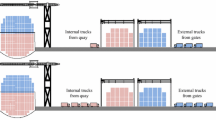Abstract
Port traffic network design is different from urban traffic flow. Port truck congestion, one of the critical port traffic network design problems, is discussed in this paper. To alleviate the truck congestion in container terminals, issues of modeling truck congestion pricing are addressed. A bi-level programming model is developed to determine the optimal toll rates. The upper level model is to minimize the average truck waiting time by optimizing toll rates of different periods. The lower level is user equilibrium model in which each truck driver chooses its arrival time according to the toll strategy of upper level model. The feedback of upper-level and lower-level model forms the optimal toll strategy. To solve the model, a method based on memetic heuristic is designed. Finally, numerical experiments are provided to illustrate the validity of the proposed model and algorithm. Results indicate that congestion toll can decrease truck’s queuing time effectively. The developed toll pricing model reflects the benefit of truckers and terminal operators, which promotes the use of toll as an efficient tool to alleviate the truck congestion and improve the terminal efficiency.









Similar content being viewed by others
References
Chen L, Yang H (2012) Managing congestion and emissions in road networks with tolls and rebates. Transp Res Part B Methodol 46(8):933–948
Chen T, Yu HC (2015) Fuzzy and nonlinear programming approach for optimizing the performance of ubiquitous hotel recommendation. J Ambient Intell Humaniz Comput 4(1):1–10
Chen X, Zhou X, List GF (2011) Using time-varying tolls to optimize truck arrivals at ports. Transp Res Part E Logist Transp Rev 47(6):965–982
Chen G, Govindan K, Yang Z (2013) Managing truck arrivals with time windows to alleviate gate congestion at container terminals. Int J Prod Econ 141(1):179–188
Chung BD, Yao T, Friesz TL et al (2012) Dynamic congestion pricing with demand uncertainty: a robust optimization approach. Transp Res Part B Methodol 46(10):1504–1518
Cottingham DN, Beresford AR, Harle RK (2007) Survey of technologies for the implementation of national: cale road user charging. Transp Rev 27(4):499–523
Giuliano G, O’Brien T (2007) Reducing port-related truck emissions: the terminal gate appointment system at the Ports of Los Angeles and Long Beach. Transp Res Part D Transp Environ 12(7):460–473
Giuliano G, O’Brien T (2008) Extended gate operations at the ports of Los Angeles and Long Beach: a preliminary assessment. Marit Policy Manage 35(2):215–235
Hiyama M, Ikeda M, Barolli L et al (2010) Performance analysis of multi-hop ad-hoc network using multi-flow traffic for indoor scenarios. J Ambient Intell Humaniz Comput 1(4):283–293
Lawphongpanich S, Hearn DW (2004) An MPEC approach to second-best toll pricing. Math Program 101(1):33–55
Lawphongpanich S, Yin Y (2011) Nonlinear pricing on transportation networks. Transp Res Part C Emerg Technol 20(1):218–235
Liu Z, Meng Q, Wang S (2013) Speed-based toll design for cordon-based congestion pricing scheme. Transp Res Part C Emerg Technol 31(2):83–98
Lou Y, Yin Y, Lawphongpanich S (2010) Robust congestion pricing under boundedly rational user equilibrium. Transp Res Part B Methodol 44(1):15–28
Lützenberger M, Masuch N, Küster T et al (2015) A common approach to intelligent energy and mobility services in a smart city environment. J Ambient Intell Humaniz Comput 6(3):1–14
Palma AD, Lindsey R (2011) Traffic congestion pricing methodologies and technologies. Transp Res Part C Emerg Technol 19(6):1377–1399
Pigou AC (1920) The economics of welfare [M]. MacMilla, Basingstoke
Small KA, Verhoef ET (2007) The economics of urban transportation [M]. Routledge, London
UNCTAD (2012) Review of maritime transport 2012 [C]. United Nations, New York, pp 251–257
Viti F, Catalano SF, Li M et al (2003) An optimization problem with dynamic route departure time choice and pricing. In: Proceedings of 82nd annual meeting of the transportation research board
Xu X, Zhang W, Li N et al (2015) A bi-level programming model of resource matching for collaborative logistics network in supply uncertainty environment. J Franklin Inst 352(9):3873–3884
Xu XF, Hao J, Deng YR et al (2017) Design optimization of resource combination for collaborative logistics network under uncertainty. Appl Soft Comput 2017:684–691
Yang H, Huang HJ (2005) Mathematical and economic theory of road pricing. Elsevier, Oxford
Yuen A, Basso LJ, Zhang A (2008) Effects of gateway congestion pricing on optimal road pricing and hinterland. J Transp Econ Policy 42(3):495–526
Zhao WJ, Goodchild AV (2014) Benefits of a truck appointment system on the service quality of inland transport modes at a multimodal container terminal. Eur J Oper Res 235(2):461–469
Acknowledgements
This research was sponsored by Project of National Social Science Foundation of China (15BGL202); project of the planning subject of “the 12th Five Year Plan” in national science and technology for the rural development in China: demonstration of key technology and equipment for safe distribution of agricultural logistics (2015BAD18B01); Project of Beijing Philosophy and Social Science (13JGC082);Project of Beijing Municipal Commission of Education (SM201410011002); Project of Innovation Ability Promotion (PXM2016 014213 000033); the Research Foundation for Youth Scholars of Beijing Technology and Business University (QNJJ2017-25).
Author information
Authors and Affiliations
Corresponding author
Rights and permissions
About this article
Cite this article
Zhang, H., Zhang, Q. & Chen, W. Bi-level programming model of truck congestion pricing at container terminals. J Ambient Intell Human Comput 10, 385–394 (2019). https://doi.org/10.1007/s12652-017-0641-y
Received:
Accepted:
Published:
Issue Date:
DOI: https://doi.org/10.1007/s12652-017-0641-y




